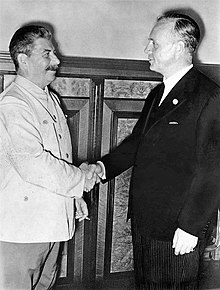European Day of Remembrance of the Victims of Stalinism and National Socialism

The European Day of Remembrance for Victims of Stalinism and Nazism ( 23 August ) is the European day of remembrance for the victims of totalitarian dictatorships in Europe in the 20th century.
The initiative to proclaim the anniversary of the German-Soviet non-aggression pact of August 23, 1939 as a day of remembrance for the victims of the two dictatorships marked by state terror and mass murder came from political emigrants from the Baltic states and other East Central European countries in North America. In 1986 the first rallies under the name Black Ribbon Day took place in several major western cities. In 1987 protests began in the Baltic States, which in 1989, on the 50th anniversary of the non-aggression pact, formed a human chain ( Baltic Way ) over 600 kilometers.
European Day of Remembrance was originally taken from the Prague Declaration (June 3, 2008), which u. a. signed by Václav Havel , Joachim Gauck and numerous members of the European Parliament, proposed and reminds of the Molotov-Ribbentrop Pact.
On September 23, 2008, 409 members of the European Parliament signed a declaration in support of the establishment of the Memorial Day. On April 2, 2009, a resolution to proclaim the day was adopted with 533 votes (44 against and 33 abstentions) and on the initiative of the East Central European states, August 23 was declared a day of remembrance for the victims of Stalinism and National Socialism , and Canada followed with the Black Ribbon Day . While Sweden and the East Central and Southern European countries included the date in their national commemorative calendars, the date received little attention in Germany, France and Great Britain.
literature
- Günter Morsch : August 23rd - a suitable European “Day of Remembrance for the Victims of All Totalitarian and Authoritarian Dictatorships”? In: Christoph Koch (Ed.): Was there a Stalin-Hitler pact? , Peter Lang 2015, ISBN 978-3-631-66422-3 , pp. 313–329.
- Stefan Troebst : From June 22, 1941 to August 23, 1939: Two places of remembrance in the history politics of larger Europe . pdf, Heinrich Böll Foundation
- Stefan Troebst: August 23rd as a Euro-Atlantic Day of Remembrance? In: The Hitler-Stalin Pact 1939 in the cultures of remembrance of the Europeans . Wallstein, Göttingen 2011, ISBN 978-3-8353-0937-1 , p. 85 ff.
Individual evidence
- ↑ Stefan Troebst: August 23rd as a Euro-Atlantic Day of Remembrance? In: The Hitler-Stalin Pact 1939 in the cultures of remembrance of the Europeans . P. 88 f.
- ↑ http://www.europarl.europa.eu/sides/getDoc.do?reference=P6_TA(2008)0439&language=DE
- ↑ http://www.europarl.europa.eu/sides/getDoc.do?pubRef=-//EP//TEXT+TA+P6-TA-2009-0213+0+DOC+XML+V0//DE
- ↑ Stefan Troebst: From June 22, 1941 to August 23, 1939: Two places of remembrance in the history politics of larger Europe . P. 7 ff.